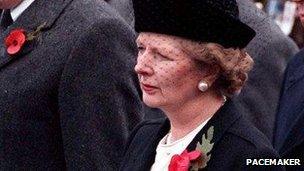Northern Ireland reacts to death of Baroness Thatcher
- Published
First Minister Peter Robinson called Lady Thatcher a 'tough no-nonsense politician'
Politicians in Northern Ireland have been giving their reaction to the death to the former Prime Minister Baroness Thatcher.
Lady Thatcher, who was Conservative prime minister from 1979 to 1990, was the first woman to hold the role.
Northern Ireland First Minister Peter Robinson said she was "one of the greatest political figures of post-war Britain".
Many others also paid tribute but some described Lady Thatcher as divisive.
Mr Robinson said he had learned of the 87-year-old's death "with great sadness".
The DUP leader described Lady Thatcher as a "transformative and powerful" and said she had "changed the face of our United Kingdom forever".
Anglo-Irish Agreement
"As our first female prime minister, she made history and as 'The Iron Lady' she was at the frontline of winning The Cold War as well as ensuring the freedom of the Falklands Islands.
"Whilst we disagreed over the Anglo-Irish Agreement, Mrs Thatcher was committed to the union and later described the Anglo-Irish Agreement as one of her greatest regrets."
Mr Robinson said the passing of Baroness Thatcher "draws to an end a remarkable life devoted to the service of the United Kingdom".
"She was one of a kind: tough, possessed of a supreme intellect and driven by conviction," he added.
Northern Ireland Secretary of State Theresa Villiers said Lady Thatcher was "one of our greatest Prime Ministers".
"I appreciate that in Northern Ireland there will be mixed views about her legacy here," she added.
"Yet in all that she did, Lady Thatcher acted out of duty, conviction and patriotism.
"Above all, during the height of the troubles in Northern Ireland, she remained steadfast in her determination that democracy and the rule of law would always prevail."
The Shadow Secretary of State for Northern Ireland, Vernon Coaker, sent his condolences on the death of Lady Thatcher.

Baroness Thatcher was prime minister during turbulent times in the history of Northern Ireland
'Historic moment'
The Labour MP said: "Her tenure as prime minister divided opinion in Northern Ireland as elsewhere in the UK.
"But the Anglo-Irish Agreement she signed with Taoiseach Garret FitzGerald was a historic moment in relations between the UK and Ireland, and helped lay the foundations of the peace process which followed in later years."
The SDLP MP Mark Durkan said Baroness Thatcher had made a "controversial impact" on political life and "divided opinion".
Sinn Fein President Gerry Adams said she had caused "great hurt to the Irish and British people" during her time as Prime Minister.
"Working class communities were devastated in Britain because of her policies," he said.
However, Ulster Unionist Party leader Mike Nesbitt said Baroness Thatcher was "a colossus of conviction politics".
'Dominant force'
"Whilst we in the Ulster Unionist Party would not have agreed with her on everything, particularly the Anglo-Irish Agreement, Northern Ireland has reason to be eternally grateful for her stance against terrorism, not least during the hunger-strikes when Northern Ireland was on the edge of something catastrophic," he added.
David Ford, the leader of the Alliance Party, described her as a "dominant force in politics" who knew what she wanted.
TUV leader Jim Allister said many would remember Lady Thatcher's "shameful decision" to support the Anglo-Irish Agreement, but added that "the extent to which she regretted this in later life was to be welcomed".
He said the flag at the Northern Ireland Assembly building should be flown at half-mast on the day of her funeral and books of condolence opened "across Northern Ireland".
- Published8 April 2013
- Published8 April 2013
- Published8 April 2013
- Published8 April 2013
- Published8 April 2013